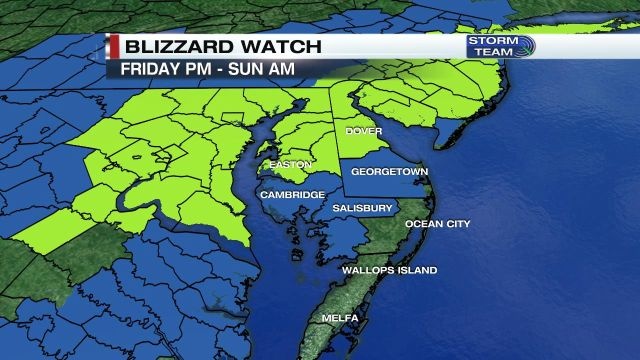UPDATE: Agencies around Delmarva prep for winter storm

Organizations around Delmarva are getting ready for the possibility of snow. With the 47 ABC Weather Team predicting snow, and high winds on Friday and Saturday, agencies around the peninsula are prepping, and asking residents to do the same. For the full forecast, visit the 47 ABC Weather page.
Several organizations have already chosen to cancel, or re-schedule their events for the weekend. Check out that list, here. Other organizations have decided to close all together, check out the full list of closings and delays, here.
Delmarva Power says they are monitoring the weather, and with high winds predicted, are preparing for the possibility of outages. Delmarva Power says they will have crews available 24 hours a day, throughout the weekend, to work on restoration efforts. Customers should still be ready for an outage, as interruptions in service are possible. Civilians are asked to stay way from downed power lines, and report outages and downed wires by calling 1-800-898-8045 for Kent and Sussex counties and Eastern Shore of Maryland.
Delmarva Power offers the following tips:
Storm preparedness tips for Delmarva Power customers:
• Assemble an emergency storm kit. Include a battery-powered radio or television, flashlight, a first-aid kit, battery-powered or windup clock, extra batteries, special needs items, an insulated cooler and a list of important and emergency phone numbers.
• Keep at least a three-day supply of nonperishable foods and bottled water and have a hand-operated can opener available.
• Have adequate prescription medicines or infant supplies on hand.
• Make sure you have a telephone with a cord or cell phone to use as a backup. Cordless telephones require electricity to operate and won’t work if there is an outage.
• Identify a safe alternate location in case of an extended outage.
• Tune to local news broadcasts for the latest weather and emergency information.
• Follow the advice of local emergency management officials.
General Safety Tips:
• Protect electronic equipment. Unplug sensitive electronics or plug computers and other sensitive equipment into surge suppressors and consider an uninterruptible power supply for temporary battery backup power.
• If a portable generator is needed, follow the manufacturer’s instructions and use only when necessary. Don’t overload it. Turn it off at night while asleep and when away from home. Never use a generator inside the home.
• Turn off power to flood-prone basement appliances if it is safe to do so. However, if using an electrically operated sump pump, the customer should not turn off the power.
• Follow local news broadcasts for the latest weather and emergency information.
Delaware Electric Cooperative says they will have crews on standby, starting Friday night and will be ready to be dispatched to restore power if outages occur. The Co-op suggests having an emergency kit assembled, and be prepared to be without power for several days.
The Red Cross recommends the following items in an emergency kit: styrofoam coolers to preserve food, ice to keep food cold, water-one gallon per person, per day, food-non-perishable, easy-to-prepare, flashlights, battery-powered or hand-crank radio, extra batteries, first aid kit, a 7-day supply of medications, and medical items, multi-purpose tool, sanitation and personal hygiene items, cell phone with charger, and family and emergency contacts
Additional DEC Safety Tips:
- Stay away from downed wires or damaged electrical equipment. Touching energized wires can lead to injuries and death. If you see downed wires, call DEC immediately.
- If you use a generator, never run it inside your home or garage. Some produce carbon monoxide fumes, which can be deadly.
The Delaware Department of Agriculture is reminding poultry and livestock growers to take precautions to shelter and protect their animals from the storm.
“Preparedness is the key to keeping animals safe,” said State Veterinarian Dr. Heather Hirst, who heads the Department’s Poultry and Animal Health Section. “Winter storm situations can be deadly to livestock and poultry, but taking the right steps can keep them healthy.”
In preparation for heavy snow and possible power outages, the Department says owners should inspect poultry houses and other structures; keep back-up generators, fuel, and filters on hand; check feed inventories; have a back-up communications plan; and mark driveways and roads with tall poles or stakes. Roofs should be cleared of snow as soon as possible, while taking proper steps for worker safety.
Other precautions recommended by the Department of Agriculture include:
- Check and secure all buildings and enclosures. Repair or secure loose boards, doors, window covers, metal sheeting, wire and equipment that could blow around in high winds.
- Provide water and food. Make sure your animals have alternate water sources in case power is lost and pumps and automatic waterers are not working. Have enough food and water on hand for seven days. Move feed to higher ground to prevent mold contamination from flooding.
- Mark animals. Identifiers for returning lost animals could include ear tags with farm name and phone numbers, brands, paint markings on hooves or coats, or clipped initials in hair coats. Leg bands can be used for back yard poultry.
- Stock up on supplies. Make sure you have basic veterinary supplies on hand and that your livestock are current on vaccinations.
The Maryland Department of Agriculture is reminding residents that Maryland law requires owners provide an adequate supply of feed and water for their animals, as well as shelter from the wind and other severe conditions. Precautions for livestock include:
- Ensuring access to clean water that is not frozen
- Increasing feed to provide energy which helps animals stay warm
- Providing shelter such as barns, forests, and hills to allow animals to escape wind and heavy snow
- Caution around icy areas to prevent falls and injuries
- Taking care while hauling livestock in icy winter weather
“Pets and livestock throughout the state can be negatively impacted by severe winter weather,” said Dr. Michael Radebaugh, State Veterinarian. “Both pets and livestock react to these harsh conditions so owners must plan ahead and take the extra steps necessary to ensure the health and safety of their animals.”
They are also reiterating that, dogs, cats, and other companion animals that live inside homes may not be able to tolerate outdoor winter temperatures for long periods of time. Guardian dogs and barn cats that live outside still need dry, clean, enclosed spaces such as dog or cat houses that help retain body heat. Other winter precautions for companion animals include ensuring:
- Access to clean water
- Adequate feed
- Good grooming
- Dry, clean shelter – such as dog houses for guard dogs (and/or limit time outdoors)
- Protection from de-icing chemicals, which can irritate skin
- Protection from antifreeze, which tastes sweet to animals, but is extremely toxic
- Proper collar or identification such as a tag or microchip. Ask your veterinarian to scan the microchip and make sure it is working at each visit.
Verizon says engineers and technicians are busily preparing the network to ensure customers can connect with their families and the resources they need when they need them most. Officials say they have installed back-up generators and batteries at cell sites across the country to maintain wireless communication even in the event of a prolonged power outage.
Verizon offers the following tips:
- Store phones, tablets, batteries, chargers and other equipment in a dry, accessible location. Simple zip-lock storage bags will shield devices, and today there are many waterproof phones, cases and other protective accessories.
- Keep phone and tablet batteries fully charged – in case local power is lost – well before warnings are issued.
- Have additional charged batteries and car-charger adapters available for back-up power. Numerous chargers, including solar-powered devices, make it easy to stay powered up.
- Maintain a list of emergency numbers – police and fire agencies; power and insurance companies; family, friends and co-workers; etc. – and program them into your wireless devices before an emergency arises.
- Use a free service such as Verizon Cloud, which provides 5MB of data storage, to save your contacts and other important information on a secure server in case your phone or tablet is lost or damaged.
- Use your tablet to photograph and catalogue your valuables and other household belongings for possible insurance claims.
Milford Police have asked drivers to stay home, if driving isn’t completely necessary, once the storm hits. They say with the projected rise in tides, also be aware when traveling on roadways in the area of the Mispillion River and low lying areas east of the city limits. Residents who live on the snow routes are also asked to remember that there is no parking after snow fall exceeds one hour, and vehicles that remain are subject to being towed. The snow routes are North Walnut Street, South Walnut Street, Lakeview Avenue, Southeast Front Street, Northeast Front Street, and Northwest Front Street.
The American Red Cross of the Greater Chesapeake Region is offering tips to help keep residents safe for the duration of the storm.
“This storm has the potential to affect our entire Region and we urge everyone to stay alert to changing weather conditions and listen to the advice of local officials,” said Scott Salemme, regional CEO for the American Red Cross of the Greater Chesapeake Region “The Red Cross stands ready to provide support, but the most important thing people can do right now is to get prepared.”
They offer the following tips:
- Download the free Red Cross Emergency App for winter weather alerts and warnings. The app’s Winter Storm section contains expert advice for what to do before, during and after winter storms. Get an emergency kit ready now – details about what should be included are on the Red Cross web site.
- During the storm, wear layers of lightweight clothing to stay warm. Be extremely careful when shoveling snow. Take frequent breaks and stay hydrated. Check on children, elderly neighbors and people with disabilities. Other safety steps include:
- Run water even at a trickle to avoid pipes freezing.
- Bring animals inside and move livestock to sheltered areas.
- If someone’s home loses power or heat during extreme cold, they should go to a designated public shelter.
- Never use a generator, grill, or other fuel or charcoal burning device inside a home, garage, basement, crawlspace or any partially enclosed area. Locate them away from doors, windows and vents that could allow carbon monoxide to come indoors.
- Watch for hypothermia and frostbite. Hypothermia symptoms include confusion, dizziness, exhaustion and severe shivering. Frostbite symptoms include numbness, flushed gray, white, blue or yellow skin discoloration, numbness, or waxy feeling skin.
- If possible, avoid driving in this storm. If someone has to drive, they should have a window scraper, kitty litter or sand in case their vehicle gets stuck, extra clothes and a Disaster Supplies Kit in the trunk. Fill the vehicle’s gas tank and clean the lights and windows to help see. Full details are available here.
- Storms like this can result in a high number of home fires.
- Use flashlights for light, not candles.
- People should never use a stove or oven to heat their home. If using a fireplace, use a glass or metal fire screen large enough to catch sparks and rolling logs
- Place space heaters on a level, hard surface and keep anything flammable at least three feet away – turn off space heaters and make sure fireplace embers are out before leaving the room or going to bed.
Worcester County Emergency Services is reminding residents that slick roadway conditions and low visibility may make driving hazardous during the event. High speed, easterly winds could cause minor coastal flooding Saturday. WCES says to be sure to secure outdoor objects before the onset of the storm, as these items could become dangerous projectiles in high winds.
If you must head out, they suggest bundle up, and exercise extreme caution, along with wear layers of lightweight clothing that can be added to or removed as needed and protect extremities by wearing gloves and hats, and be sure to protect pets from the cold as well by bringing them indoors and assuring they have access to unfrozen water.


